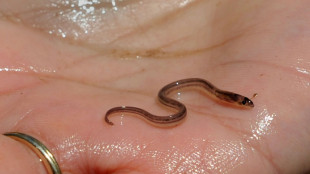
-
 Loaf behind bars: Aussie inmate says Vegemite a human right
Loaf behind bars: Aussie inmate says Vegemite a human right
-
In film's second act, 'Wicked' goes beyond Broadway musical

-
 Asian markets track Wall St down with Nvidia, US jobs in view
Asian markets track Wall St down with Nvidia, US jobs in view
-
Scott Boland: the best 'spare' fast bowler around

-
 Fire and Ashes: England bank on fast bowling barrage in Australia
Fire and Ashes: England bank on fast bowling barrage in Australia
-
North Korea says Seoul-US sub deal will trigger 'nuclear domino' effect

-
 Education for girls hit hard by India's drying wells
Education for girls hit hard by India's drying wells
-
Haitian gangs getting rich off murky market for baby eels

-
 Trump says will talk to Venezuela's Maduro, 'OK' with US strikes on Mexico
Trump says will talk to Venezuela's Maduro, 'OK' with US strikes on Mexico
-
Oscar Piastri wins Australia's top sports honour

-
 'Severely restricted': Russia's Saint Petersburg faces cultural crackdown
'Severely restricted': Russia's Saint Petersburg faces cultural crackdown
-
Polish PM denounces 'sabotage' of railway supply line to Ukraine

-
 UK toughens asylum system with radical overhaul
UK toughens asylum system with radical overhaul
-
Carney's Liberals pass budget, avoiding snap Canada election

-
 LeBron back in training, edges closer to Lakers return
LeBron back in training, edges closer to Lakers return
-
Climate talks run into night as COP30 hosts seek breakthrough

-
 Germany and Netherlands lock up World Cup spots in style
Germany and Netherlands lock up World Cup spots in style
-
Germany's Woltemade hopes for 2026 World Cup spot after scoring again

-
 Germany 'send message' with Slovakia rout to reach 2026 World Cup
Germany 'send message' with Slovakia rout to reach 2026 World Cup
-
Trump unveils fast-track visas for World Cup ticket holders

-
 Netherlands qualify for World Cup, Poland in play-offs
Netherlands qualify for World Cup, Poland in play-offs
-
Germany crush Slovakia to qualify for 2026 World Cup

-
 Stocks gloomy on earnings and tech jitters, US rate worries
Stocks gloomy on earnings and tech jitters, US rate worries
-
'In it to win it': Australia doubles down on climate hosting bid

-
 Former NFL star Brown could face 30 yrs jail for shooting case: prosecutor
Former NFL star Brown could face 30 yrs jail for shooting case: prosecutor
-
Fate of Canada government hinges on tight budget vote

-
 New research measures how much plastic is lethal for marine life
New research measures how much plastic is lethal for marine life
-
Mbappe, PSG face off in multi-million lawsuit

-
 EU defends carbon tax as ministers take over COP30 negotiations
EU defends carbon tax as ministers take over COP30 negotiations
-
McCartney to release silent AI protest song

-
 Stocks tepid on uncertainty over earnings, tech rally, US rates
Stocks tepid on uncertainty over earnings, tech rally, US rates
-
Louvre shuts gallery over ceiling safety fears

-
 'Stranded, stressed' giraffes in Kenya relocated as habitats encroached
'Stranded, stressed' giraffes in Kenya relocated as habitats encroached
-
US Supreme Court to hear migrant asylum claim case

-
 Western aid cuts could cause 22.6 million deaths, researchers say
Western aid cuts could cause 22.6 million deaths, researchers say
-
Clarke hails Scotland 'legends' ahead of crunch World Cup qualifier

-
 S.Africa says 'suspicious' flights from Israel show 'agenda to cleanse Palestinians'
S.Africa says 'suspicious' flights from Israel show 'agenda to cleanse Palestinians'
-
South Korea pledges to phase out coal plants at COP30

-
 Ex-PSG footballer Hamraoui claims 3.5m euros damages against club
Ex-PSG footballer Hamraoui claims 3.5m euros damages against club
-
Mbappe, PSG in counterclaims worth hundreds of millions

-
 Two newly discovered Bach organ works unveiled in Germany
Two newly discovered Bach organ works unveiled in Germany
-
Stocks lower on uncertainty over earnings, tech rally, US rates

-
 Barca to make long-awaited Camp Nou return on November 22
Barca to make long-awaited Camp Nou return on November 22
-
COP30 talks enter homestretch with UN warning against 'stonewalling'

-
 France makes 'historic' accord to sell Ukraine 100 warplanes
France makes 'historic' accord to sell Ukraine 100 warplanes
-
Delhi car bombing accused appears in Indian court, another suspect held

-
 Emirates orders 65 more Boeing 777X planes despite delays
Emirates orders 65 more Boeing 777X planes despite delays
-
Ex-champion Joshua to fight YouTube star Jake Paul

-
 Bangladesh court sentences ex-PM to be hanged for crimes against humanity
Bangladesh court sentences ex-PM to be hanged for crimes against humanity
-
Trade tensions force EU to cut 2026 eurozone growth forecast


A whiff of tears reduces male aggression, says study
Watching someone cry often evokes an emotional response -- but according to a new study published Thursday, human tears themselves contain a chemical signal that reduces brain activity linked to aggression.
The research was carried out by the Weizmann Institute of Science, Israel, and appeared in PLOS Biology, a US science journal. Though it involved female tears, because women made themselves available as donors, it probably isn't a sex-dependent effect, the authors say.
Numerous studies have shown rodent tears contain chemicals serving as social signals they emit on demand -- female mice tears for example reduce fighting among males; and subordinate male mole rats smear themselves in their own tears so that dominant males attack them less.
To find out whether similar effects occurred in humans, a team led by PhD student Shani Agron first exposed 25 male volunteers to either "emotional" tears, or to saline. The volunteers couldn't tell what they were sniffing as both substances are clear and odorless.
The tears were obtained from six female volunteers who watched sad films in isolation and used a mirror to capture the liquid in a vial as it trickled down their cheeks.
"When we looked for volunteers who could donate tears, we found mostly women, because for them it's much more socially acceptable to cry," said Agron in a statement.
She added that since prior research had shown tears reduce testosterone levels in men, and that lowering testosterone has a greater effect on aggression in men than in women, "we began by studying the impact of tears on men because this gave us higher chances of seeing an effect."
They had the volunteers play a computer game that had been well established in prior aggression studies, and involves accumulating money while a fictitious opponent could steal their earnings.
Given the opportunity, the men could get revenge on the other player by causing them to lose money, even though in their own case they would not gain from the opponent's loss.
Such revenge-seeking, aggressive behavior in the game dropped 43.7 percent after men sniffed the tears.
This appeared to mirror what had been observed in rodents, but unlike rodents, humans don't have a structure in their noses called a vomeronasal organ, which was lost during our species' evolution and detects odorless chemical signals.
To find out what was going on, the researchers applied the tears to 62 olfactory receptors in a lab dish and found that four receptors were activated by tears, but not saline.
Finally, the scientists repeated the experiments with the men's brains connected to MRI scanners.
The imaging revealed the prefrontal cortex and anterior insula, which are related to aggression, became more active when men were provoked during the game, but the effect was not as strong if they had sniffed tears.
"We note that crying often occurs in very close-range interactions, to the extent that 'kissing teary cheeks' is a recurring theme across cultures," wrote the authors, adding that emitting chemical signals to prevent aggression was probably even more important among infants, where verbal communication isn't possible.
P.Tamimi--SF-PST




